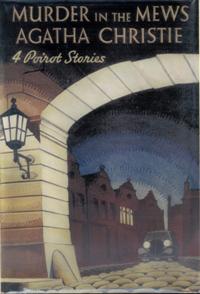Plot: Four long mysteries for Poirot.
Murder in the Mews:
“What are they like? Gay? Lots of Parties? That sort of thing?”
Poirot and Japp investigate a murder in a house where two ladies live together. One plays golf. It's impossible not to read this as accidental lesbian hilarity, even though there's not a whisker of it in the story itself. Instead it's a rather robust narrative about a blackmailer gradually ensnared in a trap of his own making. The pay-off to the story is very satisfying as Christie manages (even with a very limited cast list) to nudge you in one direction while at the same time pulling the rug from under you. It WAS who you thought it was, but not for the reasons you suspected. If you see what I mean.
The Incredible Theft:
“Here I scream” said Poirot helpfully. He opened his mouth and let out a shrill little bleat.
A country house, stolen plans, a weekend party of spies and gamblers... and a maid who has seen a ghost. It's all amiable stuff, with Poirot at his mischievous best. He's being told a pack of lies by nearly everyone and doesn't fail to let them all know that he finds it vastly amusing. It's a story about truth – or about good lies. As Poirot puts it pointedly “The lies I invent are always most delicate and most convincing”. He is both reassuring his host and also reminding the household that they are amateurs up against an expert on truth.
Essentially Poirot finds himself in a classic crime situation and proceeds to enjoy himself immensely. So great is Poirot's enjoyment that he even appears to chat up a maid, and get chatted up in return. He certainly is at great pains to praise her beauty. Maybe this is simply due to their shared Gallic nature?
Dead Man's Mirror
“One cannot escape one's Karma.”
Another “ideal for television” adventure featuring a country house, a locked-room and a lot of suspects, this manages to be a fairly straightforward Poirot pot-boiler set among the Chevenix-Gores. This is a household of improbables and suspectables right out of The Murder Of Roger Ackroyd, and it rattles along at a fair pace... right up to an ending that made me go “oh no, hang on, there are too many suspects – which one of you are you again?”. But it's a ripping yarn.
Triangle At Rhodes
Poirot is on a beach holiday. Sat next to a woman who fancies herself as an observer of human nature. Yet it is Poirot who spots a crime in the offing. Readers of Death On The Nile and Curtain will recognise two things – Poirot issuing a significant warning, and Poirot detecting the hand of a social manipulator at work. The story also bears similarities with one of Miss Marple's 13 Problems, and is another great example of how Agatha Christie ensures that bad things happen to husband-stealing women.


No comments:
Post a Comment